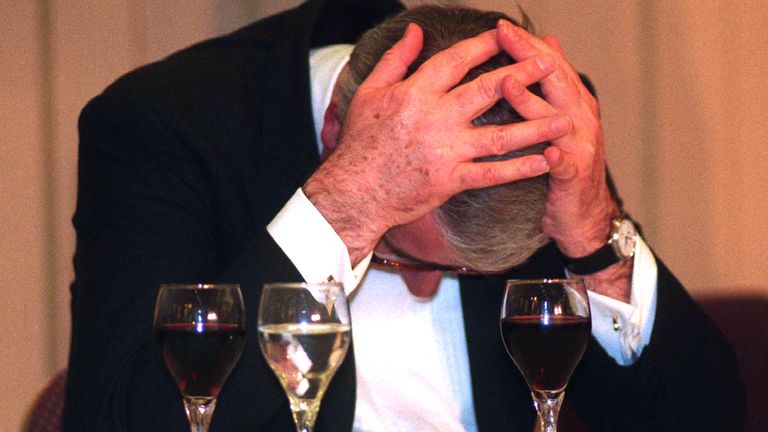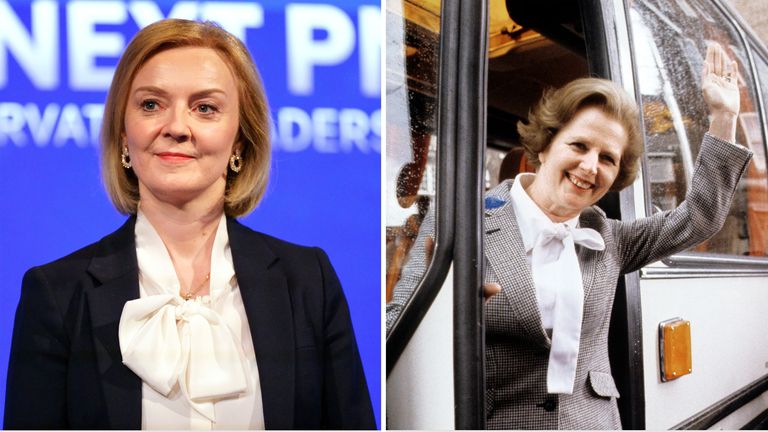For more than six decades, some of the UK’s most devastating economic events have happened under an autumn cloud. Is history repeating itself?
The poet and banker T S Eliot got it wrong – April is not the cruelest month, at least when it comes to financial crises. Autumn is crueller.
The months of September, Octobe,r and November are when gestating economic turbulence tends to burst into full-blown economic storms.
The precedent of the calendar should give the prime minister and chancellor something additional to worry about as the government insists the present shocks to sterling, inflation and mortgages are nothing to worry about in spite of the Bank of England having to intervene with £65bn worth of reserves.
The big daddy of them all, the Wall Street Crash in the United States, is dated to September and October 1929. In the UK, the economic crises of the post-Second World War period have had an autumnal flavour.
Timeline of tumbles
November 1967: The Wilson government’s “pound in your pocket” devaluation took the value of a pound sterling down to $2.47.
October 1974: At the second general election of that year, Labour consolidated its victory over Ted Heath’s Conservative government. Heath’s chancellor, Sir Anthony Barber, quit politics after his disastrous “dash for growth”.
October 1976: The “Crisis What Crisis” crisis when the UK needed a $3.9bn bailout loan from the IMF. Free-floating exchange rates pushed the pound to a then-record low of $1.57.
26 October 1989: Nigel Lawson, at the time the longest-serving Chancellor, resigned from Margaret Thatcher’s government over economic policy differences, precipitating the year-long Tory turmoil that resulted in her resignation as prime minister.
October 1990: John Major, the Conservative prime minister, took the pound into the European Exchange Rate (ERM) mechanism, having failed to announce the decision at the Conservative Party conference days before.
16 September 1992: Black Wednesday. The pound crashed out of the ERM after the failure of the Major government’s panic measures, which briefly lifted interest rates as high as 15%. Although it had only been re-elected that summer and although the new chancellor, Kenneth Clarke, adopted a new economic strategy, the government’s fortunes never recovered. Labour and Tony Blair won the election in May 1997 by a landslide.
September 2007. The building society Northern Rock closed its doors to savers. To continue trading, it had to seek support from the Bank of England as lender of last resort. By February 2008 the mortgage lender had to be nationalised. It was an early harbinger of:
September 2008 banking crisis: Overextension and insecure loans resulted in the bankruptcy of Lehman Brothers and the need for taxpayer bailouts of lending institutions on both sides of the Atlantic.
Gordon Brown “saves the world [banking system]” by marshaling an emergency meeting of the G20. In the UK, the public stakes taken to support major banks resulted in a squeeze on public spending and the “austerity” policies followed by subsequent governments.
October 2016: The pound dropped 28% after the vote to leave the EU, hitting a then-record low of US$1.14.
September 2022: Markets lose confidence in UK economic management after an uncosted “fiscal event” announcement by the new chancellor, Kwasi Kwarteng, on 23 September. The pound dips to a new record low of $1.03 before recovering to around $1.08.
Gilt yields, the driver of domestic inflation, surged – even as pension funds obliged to sell them courted bankruptcy until the Bank of England made its intervention. Hundreds of mortgage products were withdrawn, paralysing the housing market. The International Monetary Fund publicly rebuked the government for proposing huge tax cuts without the funds to pay for them.
That is where the UK finds itself today, on top of the cost of living crisis it already faced, in large part because of Russia’s attack on Ukraine and the consequent rises in energy prices.
It is too soon to tell where the economy is going to end up. Each of the autumnal plunges listed above had different causes resulting from the same mix of political and financial ambitions, and human hubris, greed, ambition, and overconfidence.
But why in autumn?
The reasons economic crises come to a head in the autumn are speculative. It is certainly a time of year for stocktaking in Western market economies after a break or slowdown over the summer holiday period.
Autumn, mid-October this year, is when the International Monetary Fund and the World Bank hold their annual joint meeting. With the year’s three-quarters done, it is natural to look back and assess whether things have gone well or badly. If there are problems, governing politicians and markets are likely to take steps to correct them, which sometimes only leads to bigger mistakes.
Autumn crunch points are stronger in this country because of the long summer parliamentary recess and the ritual of the annual party conference season.
If they had to change leader, and Tory MPs decided Boris Johnson had to go, they were determined to have a new leader in place in time for a relaunch at the Conservative Party conference next week in Birmingham.
No need for an ethics watchdog
Ms Truss, in turn, was so anxious to hit the ground running that she launched her new economic strategy without running it through the usual channels of the Office of Budget Responsibility (OBR) and having sacked Sir Tom Scholar, the long-standing permanent secretary at the Treasury.
The OBR is not the only regulatory institution treated with contempt by Ms Truss. She has also closed down the National Security Council and the Independent Office of Tax Simplification and suggested she will not need a No 10 ethics watchdog.
Her role model Margaret Thatcher – who like Sir Tony Blair avoided economic smashes while in office – played by the rules and conventions. She believed in balancing the books and famously observed, “You can’t buck the markets.”
The new prime minister thinks she and her chancellor know better, commenting: “We have had a consensus of the Treasury, of economists, with the Financial Times, with other outlets, peddling a particular type of economic policy for 20 years. It hasn’t delivered growth.”
Gamble
One can quibble with the accuracy of this statement, noting the early decade of this century was mostly characterized by on or above-trend growth and that since 2010, a Conservative government has been in charge, of which Ms Truss has been a supporter and member.
What matters is that Ms Truss has decided to gamble the economy on a new policy of pursuing growth at all costs even when her proposals seem contradictory, such as simultaneous borrowing, tax cuts, and huge government spending, to stabilize energy markets only temporarily.
Her opponent for the leadership, Rishi Sunak, warned of the consequences of her plans but was rejected by the party membership.
DISCLAIMER: Independentghana.com will not be liable for any inaccuracies contained in this article. The views expressed in the article are solely those of the author’s and do not reflect those of The Independent Ghana
Source: Skynews


